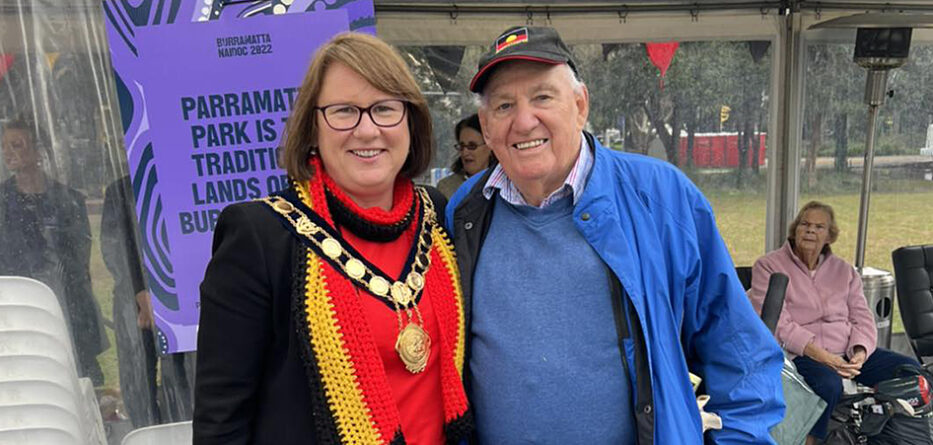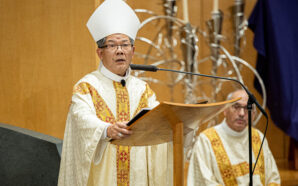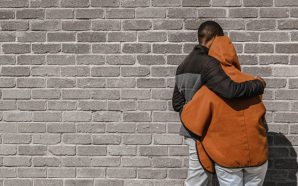In 1997, Parramatta City Council made the first Australian council apology to the Stolen Generations – the children of Aboriginal and Torres Strait Islander descent who, from the mid-1800s through to the 1970s, were removed from their families due to government policies.
This historic event, 11 years before the Australian Government’s National Apology in 2008, came about through St Patrick’s Cathedral parishioner Phil Russo. Phil, Parramatta’s Deputy Mayor between 1993 and 1994, and then again in 1997 to 1998, had attended the conference where Bringing Them Home, the report into the separation of Aboriginal and Torres Strait Islander children from their families, was launched. At his report back to the Council, he moved an apology, which was narrowly approved 8 to 7 votes. At the time, people feared the worst – in Phil’s words: “All hell broke loose” as people worried about what the ramifications might be.
As history showed, it was the right thing to do.
Former City of Parramatta Lord Mayor Donna Davis, now NSW Member for Parramatta, explains how the Council continues to lead in this area. “It is time for the Australian Constitution to reflect Australia’s identity and recognise our shared history and continuous ancient Indigenous culture,” she says. “I’m proud that the City of Parramatta resolved in early 2022 to support the principles of the Statement from the Heart and for the constitutional recognition of Aboriginal and Torres Strait Islander peoples.”
Phil, who was awarded an OAM in 2013, and has been a parishioner at St Patrick’s for over 50 years, has turned his attention to raising the ‘Yes’ case for The Voice referendum scheduled to take place later this year. “This is the most important vote ever in our history, to right the wrongs, and recognise the mistakes of our past in the treatment of the first peoples of this land,” says Phil.
Phil believes it is time Aboriginal and Torres Strait Islanders in Australia are given the chance to be recognised in the Australian Constitution and advise the government on matters relating to their wellbeing and culture.
Phil agrees there is so much discussion about The Voice, that it can be confusing. Recently, he points out, the Solicitor-General released his legal opinion that the Voice doesn’t pose a threat to Australian democracy. He also advises people to check the Australian Electoral Commission’s register of disinformation about the referendum and to get the facts from the official website about The Voice.
Phil’s passion for social justice has been lifelong. Growing up in the 1930s and 40s, he experienced regular discrimination, even from within his own family, due to his father’s Italian heritage. Then, as a young man, travelling in the merchant navy, he saw how Aboriginal and Torres Strait Islander people were treated differently, even down to only being allowed to sit in the worst seats in the cinema. At the time, 17-year-old Phil mustered the courage to tell the cinema owner it wasn’t right. “He just told me I could leave if I didn’t like it,” he recalls.
He particularly credits his Catholic upbringing for his views and advocacy. “My mother was a devout, practising Catholic who instilled a strong devotion to charity and love for everyone,” he says. The Sisters of St Joseph nuns who educated him also made an impact.
“By example and prayers, these good women showed us to respect and love everybody,” he says.
Phil is appalled that it wasn’t until 1967 that Aboriginal and Torres Strait Islander people were counted as part of the population of Australia and sadly discusses the devastating impact colonisation has had on every aspect of their lives. He is hopeful the results of the 1967 referendum, 90% ‘yes’, will encourage voters today, and like the 1997 apology, all fears will be shown to be unfounded. At 89, he is still actively contributing to the social justice pages in St Pat’s Matters, the magazine of St Patrick’s Cathedral and until recently was a member of the Parramatta Council Aboriginal and Torres Strait Islander Advisory Committee.
The last line of the 2017 Uluru Statement from the Heart, which was endorsed by the Australian Catholic Bishops Conference in 2021, particularly resonates with him, with its message of accompanying Indigenous people to build a better future.
“We invite you to walk with us in a movement of the Australian people for a better future.”
For more information on The Voice go to voice.niaa.gov.au and ulurustatement.org
In May 2023, the Australian Catholic Bishops Conference released a statement on The Voice to Parliament, urging all Australians to engage in the debate productively and respectfully, and acknowledging The Voice could be a significant step towards a more just and equitable Australia. To read the full Bishop’s statement go to bit.ly/BishopsVoice
The National Aboriginal and Torres Strait Islander Catholic Council (NATSICC) has launched a new website called “One Journey, Together” for Catholics to learn about the Indigenous Voice to Parliament. The website hosts stories and anecdotes from Aboriginal and Torres Strait Islander communities and organisations, Catholic figures and Catholic organisations. Go to www.indigenousvoice.church to learn more.
This article was originally published in the 2023 Ordinary Time | Winter edition of the Catholic Outlook Magazine. You can read the digital version here.








